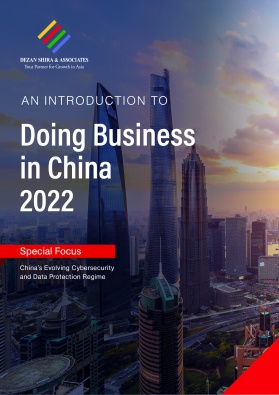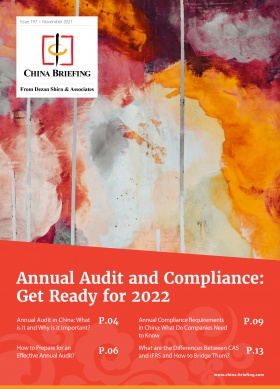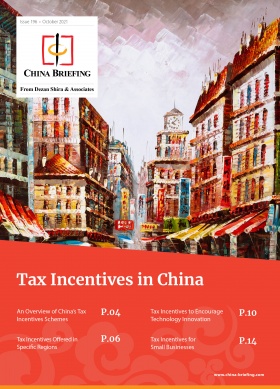China’s Negative List for Foreign Investment Access (New Edition): English Version Available
The latest edition of China’s foreign investment negative list has been released. The new list cuts down the number of items restricted or prohibited to foreign investors from 33 to 31, widening access to more industries and fields.
On December 27, 2021, the National Development and Reform Commission (NDRC) and the Ministry of Commerce (MOFCOM) jointly issued the Special Administrative Measures (Negative List) for Foreign Investment Access (2021 Edition), which will come into effect on January 1, 2022.
As one of the most important documents governing foreign investment access in the China market, the China Briefing team has produced a quick translation for your reference.
For a summary and analysis of the major changes, see our article: China’s 2021 Negative Lists Widen Market Access for Foreign Investment.
The Special Administrative Measures (Negative List) for Foreign Investment Access (2021 Edition)
Note
I. The Special Administrative Measures (Negative List) for Foreign Investment Access (hereinafter referred to as the “Negative List for Foreign Investment Access”) sets out on a unified basis the special administrative measures for foreign investment access such as equity requirements, senior management personnel requirements, etc. Fields not mentioned in the Negative List for Foreign Investment Access are administered under the principle of equal treatment for domestic and foreign capitals. Domestic and foreign investors shall uniformly apply the relevant provisions of the Negative List for Market Access.
II. No overseas investor may engage in investment and business activities in the capacity of an individually owned business, an investor in a sole proprietorship enterprise, or a member of a farmers’ cooperative.
III. Foreign-invested enterprises investing in China should comply with relevant provisions of the Negative List for Foreign Investment Access.
IV. When performing duties pursuant to the law, the relevant authorities shall not process relevant matters including application for a permit, enterprise registration, etc. for proposed investments by overseas investors in fields mentioned in the Negative List for Foreign Investment Access that does not comply with the provisions of the Negative List for Foreign Investment Access; where approval for a fixed asset investment project is involved, the relevant approval matters shall not be processed. No foreign-invested partnership business may be established in any investment field subject to equity requirements.
V. Upon review by the relevant competent departments of the State Council and approval by the State Council, the provisions of the Negative List for Foreign Investment Access on the relevant fields may not apply to specific foreign investments.
VI. Domestic enterprises engaged in businesses in fields prohibited from investment mentioned in the Negative List for Foreign Investment Access shall be examined and approved by the relevant competent authorities of the state for issuing shares abroad and going public for trading; Overseas investors shall not participate in the operation and management of the enterprises, and their equity ratio shall be governed by reference to the relevant regulations on the management of domestic securities investment of overseas investors.
VII. Where domestic companies, enterprises, or natural persons merge or acquire their affiliated domestic companies through a company legally established or controlled overseas thereby, the relevant provisions on foreign investment, overseas investment, foreign exchange administration, etc. shall apply.
VIII. The cultural, financial, and other fields not listed in the Negative List for Foreign Investment Access and relevant measures for administrative approval, qualifications, and national security shall be subject to the existing provisions.
IX. Where the Mainland and Hong Kong Closer Economic Partnership Arrangement and their follow-up agreements, the Mainland and Macau Closer Economic Partnership Arrangement and their subsequent agreements, the Cross-Straits Economic Cooperation Framework Agreement and their subsequent agreements, or the international treaties or agreements to which China accedes or is a signatory contain more preferential provisions on access treatment for overseas investors, the relevant provisions may apply. If more preferential opening-up measures are taken for eligible investors in special economic zones such as pilot free trade zones, relevant provisions shall apply.
X. The Negative List for Foreign Investment Access shall be interpreted by the National Development and Reform Commission and the Ministry of Commerce in concert with the relevant authorities.
XI. The Negative List for Foreign Investment Access (2020 Edition) issued by the National Development and Reform Commission and the Ministry of Commerce on June 23, 2020 will be abolished as of January 1, 2022.
The Special Administrative Measures (Negative List) for Foreign Investment Access (2021 Edition)
| No. | Special management measures |
| I. Agriculture, forestry, animal husbandry, and fishery | |
| 1 | The Chinese Party for the selection of new wheat varieties and seed production shall hold no less than 34% of the shares, and the selection of new corn varieties and seed production must be controlled by the Chinese Party. |
| 2 | Investment in research and development, cultivation and plantation of Chinese rare and unique precious fine varieties, as well as manufacturing of the relevant propagative materials, (including excellent genes of planting, husbandry, and aquaculture), shall be prohibited. |
| 3 | Investment in breeding genetically modified varieties of crop seeds, livestock and poultry breeds, and aquatic breeds, as well as manufacturing of genetically modified seeds (seedlings) thereof, shall be prohibited. |
| 4 | Investment in fishing of aquatic products in marine areas under Chinese jurisdiction and within Chinese territorial waters shall be prohibited. |
| II. Mining | |
| 5 | Investment in exploration, mining, and beneficiation of rare earth, radioactive minerals, and tungsten shall be prohibited. |
| III. Manufacturing | |
| 6 | Printing of publications must be controlled by the Chinese Party. |
| 7 | Investing in the application of steaming, stir-frying, moxibustion, calcination of Chinese herbal medicines, and other processing techniques as well as the production of confidential prescription products of proprietary Chinese medicines shall be prohibited. |
| IV. Production and supply of electricity, heat, gas, and water | |
| 8 | For the construction and operation of nuclear power plants, the controlling stake shall be held by the Chinese Party. |
| V. Wholesale and retail trade | |
| 9 | Investment in wholesale, retail of tobacco, cigarettes, re-dried leaf tobacco, and other tobacco products shall be prohibited. |
| VI. Transportation, warehousing, and postal industries | |
| 10 | Domestic water transport companies must be controlled by the Chinese Party. |
| 11 | The controlling stake of public air transport companies shall be held by the Chinese Party, the investment ratio of a foreign investor and its affiliates shall not exceed 25%, and the legal representative shall be a Chinese citizen. The legal representative of a general aviation enterprise shall be a Chinese citizen; the general aviation enterprises serving the agricultural, forestry, and fishery industries shall be limited to the form of equity joint venture; a controlling stake in other general aviation enterprises shall be held by the Chinese party. |
| 12 | For the construction and operation of civil airports, the comparative controlling stake shall be held by the Chinese Party. Foreign parties may not participate in the construction and operation of the airport tower. |
| 13 | Investment in postal companies and domestic express mail business shall be prohibited. |
| VII. Information transmission, software, and information technology services | |
| 14 | Telecommunications companies are subject to the provision of telecommunications services opened up pursuant to China’s WTO commitments; the foreign share ratio for value-add telecommunications services (except for ecommerce, domestic multi-party communications, storage-forwarding, and call centers) shall not exceed 50%; and the controlling stake shall be held by the Chinese party for basic telecommunications services. |
| 15 | Investment in Internet news service, Internet publishing service, Internet audio-visual program service, cyberculture operation (except for music), and Internet information dissemination service (except for contents opened up in China’s WTO commitments) shall be prohibited. |
| VIII. Leasing and business service | |
| 16 | Investment in Chinese legal matters (except for the provision of information on the impact on the Chinese legal environment) shall be prohibited and a foreign investor shall not be appointed as a partner of a domestic law firm. |
| 17 | Market surveys shall be limited to the form of equity joint venture; for radio and television rating surveys therein, the controlling stake shall be held by the Chinese party. |
| 18 | Investment in social surveys shall be prohibited. |
| IX. Scientific research and technical services | |
| 19 | It is prohibited to invest in the development and application of human stem cells and gene diagnosis and treatment technologies. |
| 20 | It is prohibited to invest in humanities and social science research institutions. |
| 21 | It is prohibited to invest in geodetic surveying, marine surveying and mapping, aerial photography for surveying and mapping, ground motion surveying, and surveying and mapping of administrative boundaries. Preparation of topographic maps, world administrative area maps, national administrative area maps, maps of administrative areas at or below the provincial level, national teaching maps, local teaching maps, true three-dimensional maps and electronic navigation maps; and regional geological mapping, mineral geology, geophysics, geochemistry, hydrogeology, environmental geology, geological disasters, remote sensing geology and other surveys (the mining right holders are not subject to these special administrative measures when carrying out work within the scope of their mining rights). |
| X. Education | |
| 22 | Pre-school education, ordinary high school, and higher education institutions are subject to Sino-foreign cooperative education and must be led by the Chinese Party (the president or the chief executive shall have Chinese nationality, and the Chinese Party shall comprise not less than half of the council, board or joint administrative committee). |
| 23 | It is prohibited to invest in compulsory education institutions or religious education institutions. |
| XI. Health and social work | |
| 24 | Medical institutions are limited to the form of equity joint venture. |
| XII. Culture, sports, and entertainment | |
| 25 | It is prohibited to invest in news organizations (including but not limited to news agencies). |
| 26 | Investment in editing, publishing, and production of books, newspapers, periodicals, audio-visual products, and electronic publications shall be prohibited. |
| 27 | Investment in various levels of radio stations, television stations, radio and television channels (frequencies), radio and television transmission network (transmitter stations, relay stations, radio and television satellites, satellite uplink stations, satellite receiving stations, microwave stations, surveillance stations, and cable radio and television transmission network, etc.) shall be prohibited. It is also prohibited to engage in the business of video broadcasting by order of radio and TV and the installation services of ground receiving facilities for satellite TV broadcasting. |
| 28 | Investment in companies producing and operating radio and television programs (including the introduction of businesses) shall be prohibited. |
| 29 | Investment in film production companies, distribution companies, cinema companies, and film importation businesses shall be prohibited. |
| 30 | Investment in auction companies for heritage auctions, heritage stores, and state-owned heritage museums shall be prohibited. |
| 31 | Investment in performing arts groups is prohibited. |
Disclaimer: The translation was produced by the China Briefing team for general information purposes only. No liability is assumed for the accuracy of the content. For advice on your specific business queries, please contact a qualified professional advisor. You are welcome to consult our experts at Dezan Shira & Associates by emailing us at China@dezshira.com.
About Us
China Briefing is written and produced by Dezan Shira & Associates. The practice assists foreign investors into China and has done so since 1992 through offices in Beijing, Tianjin, Dalian, Qingdao, Shanghai, Hangzhou, Ningbo, Suzhou, Guangzhou, Dongguan, Zhongshan, Shenzhen, and Hong Kong. Please contact the firm for assistance in China at china@dezshira.com.
Dezan Shira & Associates has offices in Vietnam, Indonesia, Singapore, United States, Germany, Italy, India, and Russia, in addition to our trade research facilities along the Belt & Road Initiative. We also have partner firms assisting foreign investors in The Philippines, Malaysia, Thailand, Bangladesh.
- Previous Article China’s 2021 Negative Lists Widen Market Access for Foreign Investment
- Next Article China’s Negative List for Foreign Investment Access in FTZs (New Edition): English Version Available







